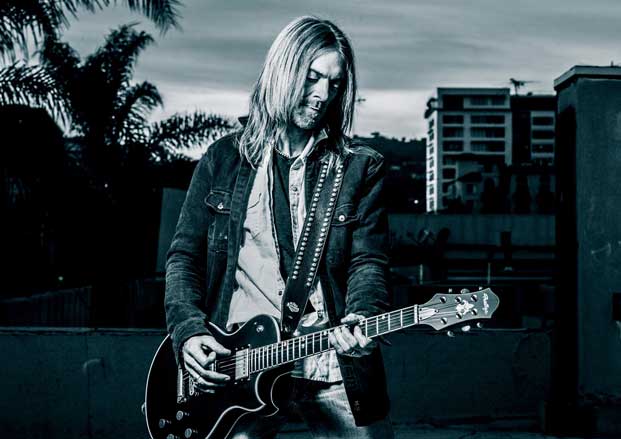Former Pantera Bassist Rex Brown is Excited to Show off His GuitarSkills on'Smoke on This'

For heavy music fans, the name Rex Brown is synonymous with viciously rhythmic, cowboy-from-hell bass playing. But the Texas-born metal veteran is about to torch sonic expectations with the release of his first-ever solo album, Smoke on This.
After years laying down the low end with Pantera, Down and most recently Kill Devil Hill, Brown is strapping on a six-string, taking center stage and debuting his whiskey-soaked, 101-proof croon on a mix of adrenaline-charged boogie, melodic ballads and more.
And though he’s been wielding a four-string bass in the public eye for 30-plus years, swapping instruments was a natural move for the musician.
“I’ve been playing guitar since I was nine or 10 years old. I played guitar on Pantera, you know? Underneath Cowboys from Hell, that’s me. ‘Cemetery Gates’? All the acoustics are me,” he reveals, while also acknowledging that he’s benefitted from some world-class instructors. “I’ve learned a lot. If you sit and write riffs with Dimebag Darrell for 20-plus years, you better learn something. If you don’t, you’re out of your fucking mind.”
Brown has backed a number of serious players over the years, like Dime, Down’s one-time tag-team of Pepper Keenan and Kirk Windstein, Alice in Chains’ Jerry Cantrell and Kill Devil Hill’s Mark Zavon. After Kill Devil Hill wound down touring in the wake of 2013’s Revolution Rise, Brown took some well-needed time off in his current home base of Nashville before connecting with current co-conspirator and guitarist Lance Harvill. Friends since the “Dallas Days” in the Eighties, they reconnected with grand plans to work outside of the box.
“We got together and told each other we were going to pull literally everything we had off of our phones, any ideas we had,” Harvill explains. “We just dumped them into a giant barrel and Rex went to town shaping everything.”
The anything-goes treatment yielded an especially diverse collection of cuts, from the hard-wired rock licks of “Lone Rider” and the slippery, bottleneck leads on the Southern-boogie blast “So Into You,” to the lush, melodic mid-album ballad, “Fault Line.” But regardless of the style of the track, Brown is consistent in his approach to the guitar.
Get The Pick Newsletter
All the latest guitar news, interviews, lessons, reviews, deals and more, direct to your inbox!
“When I pick up an instrument, I attack it,” he says. “I don’t just baby it, I don’t sit there and strum it. I want to hear every note, you know what I’m saying?” Brown, who naturally also handled bass duties on Smoke on This, remarks that the album is “where I’m at today, and where I want to go,” but also acknowledges that pieces from his past pop up in places.
He cites the massive influence of ZZ Top’s Southern stomp on his own songwriting; his love of Led Zeppelin creeps into “Buried Alive,” an introspective piece contemplating pain and the loss of Dimebag Darrell; and there’s even a Pink Floyd–style psych-trip baked into “Best of Me.”
“Sometimes you’ve got to go backward to go forward,” says Brown. “You don’t want to sound like those old bands, but by god those are your influences.” While in tune with his past, Brown is adamant about pushing himself forward, noting that Smoke on This isn’t a retro record, nor a retread of anything in his impressively prolific back catalog.
“Anybody that’s going to listen to this record thinking it’s a Pantera record, just don’t bother. It’s not. And it doesn’t sound like Down or like Kill Devil Hill,” he says. “If you’re a musician and you’re not stretching your boundaries, if you haven’t found that 13th note even though there’s 12, then you ain’t looking, Jack. That’s all there is to it! Any respected artist that’s been as successful as I have that ain’t looking for that 13th note is either dead or they’re fucking stupid.”
Gregory Adams is a Vancouver-based arts reporter. From metal legends to emerging pop icons to the best of the basement circuit, he’s interviewed musicians across countless genres for nearly two decades, most recently with Guitar World, Bass Player, Revolver, and more – as well as through his independent newsletter, Gut Feeling. This all still blows his mind. He’s a guitar player, generally bouncing hardcore riffs off his ’52 Tele reissue and a dinged-up SG.
“When I first heard his voice in my headphones, there was that moment of, ‘My God! I’m recording with David Bowie!’” Bassist Tim Lefebvre on the making of David Bowie's Lazarus
“One of the guys said, ‘Joni, there’s this weird bass player in Florida, you’d probably like him’”: How Joni Mitchell formed an unlikely partnership with Jaco Pastorius










